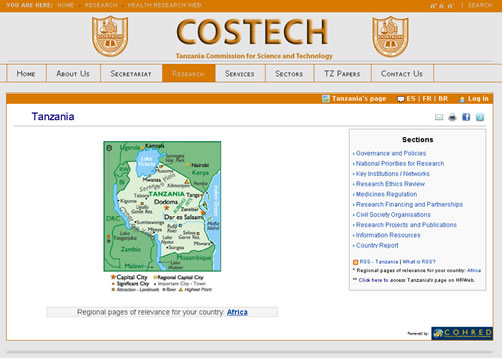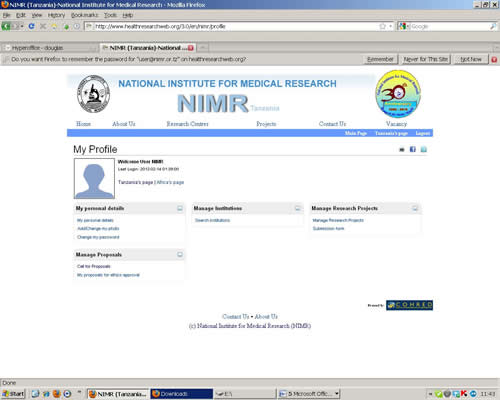Strengthening research and innovation governance in Tanzania
|
“Nations’ economic change and sustainable development are to a large measure accounted for by investments in science, technology and innovation. It is … the ability of countries to produce, harness and wisely use scientific knowledge and related technological innovations that transform economies and stimulate human development.” NEPAD (2007) Governing Science, Technology and Innovation in Africa,Building National and Regional Capacities to Develop and Implement Strategies and Policies |
The Research for Health (R4HA) programme is a partnership between the New Partnership for Africa’s Development Planning and Coordinating Agency (NEPAD) of the African Union and COHRED, and is funded by the Netherlands Ministry of Foreign Affairs. R4HA aims to strengthen national research governance in African countries through the support and development of effective research systems for promoting health, science, technology and innovation. The Commission for Science and Technology (COSTECH), under the Ministry of Science and Technology, and the National Institution for Health Research (NIMR), under the Ministry of Health, signed up to participate in the R4HA programme.
Tanzania’s implementation of the 5 major R4HA activities
1. Strengthen national governance and policy frameworks through the establishment of research priorities and development of a national research agenda
Tanzania is one of the few low- to middle-income countries that acknowledged the need to provide financial support to research and development for science and technology. In 2009, President Kikwete made a pledge to increase funding for science research and development from 0.3% to 1% of gross domestic product.
Five priority areas were identified for the increased budget:
- Training scientists and researchers;
- Improving R&D infrastructure and facilities;
- Facilitating use of research findings and technology harmonization;
- Directing research and technology towards MDGS, and
- Coordinating and evaluating science and technology performance
Some of the increased budget was allocated by COSTECH identify research proposals to be funded by the government. To ensure that selected research proposals best reflected national research priorities, COSTECH, through R4HA, sought support from COHRED to design a priority setting approach that would work across numerous sub-sectors that COSTECH represents. Working together, a standardised priority setting approach was developed for implementation across a number of multi-sector workshops to be implemented over a 3-month period in 2011. The resulting reduced priorities were shared with constituents at a national meeting in April 2012.
2. Develop a web-based research and innovation governance information system
COHRED assisted COSTECH in moving from a paper-based manual selection process to a web-based platform. COSTECH identified that their most pressing need was the creation of an online platform for putting out Calls for Proposals and allowing researchers to submit their proposals online for administrative processing and review. Using COHRED’s Health Research Web (HRWeb) as a foundation, an embedded-customized Call for Proposal platform was established and tested by COSTECH staff. The platform allows for direct, online communication between researchers submitting proposals, COSTECH administrative staff who will oversee the treatment and response to the proposals, and professional reviewers who will provide input into whether a proposal should receive funding or not. Through ongoing email communication and meetings, the embedded platform has been customized to meet COSTECH’s specific process needs.
COHRED also assisted NIMR to streamline its national ethics review process in Tanzania. R4HA met with NIMR staff to determine their needs in moving from a manual, paper-based ethics review process to an on-line web-based system built upon a customized application of COHRED’s HRWeb. The platform is currently undergoing testing at NIMR to work towards finalisation of the product. HRWeb is embedded in NIMR’s website for ease, facilitation and ownership of use


3. Improve policy implementation through the increased standardisation and use of a national coordinated research ethics review system and through the identification of monitoring and evaluation indicators to measure contribution of research investment.
Plans are underway to link the COSTECH and NIMR websites through the research ethics sections of their HRWeb-embedded research governance information systems. This will help make the research ethics process in Tanzania more efficient and seamless for the researchers using the system. Security of information will, of course, be maintained and held by each institution.
Additionally, discussions with COSTECH and NIMR started in October 2012 to identify 3-4 research ethics institutional review boards (IRBs) that perform local rather than national ethics reviews. The aim is to offer COHRED’s RHInnO (Research for Health and Innovation Organizer) Ethics platform at the local level. RHInnO Ethics is a standardised research ethics package that local IRBs can use to collect and manage local research ethics review information. Through this activity, Tanzania will become a model for utilising an integrated research ethics web-based platform to enhance communication and improve efficiency of the existing sluggish and paper burdensome research ethics process in place, which currently cannot be linked up across the country.
4. Bolster cross-country exchange for strengthening national research and innovation governance system capacity.
Working initially with 3 countries representing different economic and language regions of Africa, one of the aims of the R4HA programme is to provide opportunities for country representatives to exchange information and share expertise. These opportunities are provided through R4HA cross-country meetings and workshops, involvement in global conferences and forums, and through study visits to specific countries to showcase progress as well as effective approaches and methods.
Country representatives from Mozambique, Senegal and Tanzania have met twice formally since the R4HA programme began in May, 2010.
To address the request from other countries to learn more about the Tanzanian experience with establishing and strengthening a research for health governance system, a 5-day study visit was hold in Dar es Salaam in October 2012, in partnership with NIMR and COSTECH, so that representatives from other countries may benefit from the excellent example of Tanzania’s capacity strengthening efforts.
5. Disseminate best practice information to expand research for health and innovation at the regional level.
R4HA and its country partners from Mozambique, Senegal and Tanzania have teamed up with other relevant initiatives, such as the research governance systems work of the West Africa Health Organization (WAHO) to bring country representatives together to share expertise and best practices.
